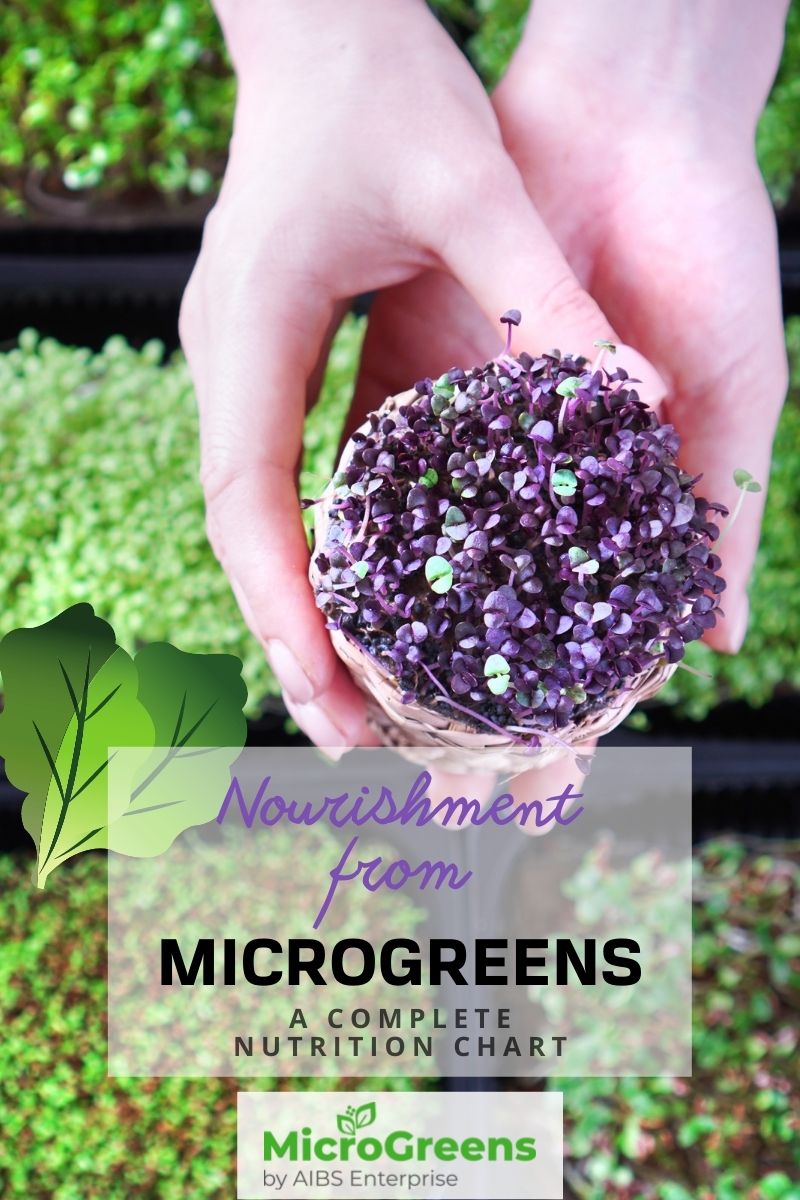Microgreens are tiny plants, typically harvested within two weeks of germination, that pack a powerful nutritional punch. A single serving of microgreens can provide grams of fiber, protein, and a variety of vitamins and minerals. This complete nutrition chart showcases the nutrients found in some of the most popular microgreens varieties.
Table of Contents
The Amazing Benefits of Microgreens
Microgreens are a type of edible plant that is harvested shortly after it germinates. They are typically less than 8 inches tall and have a more intense flavor than their mature counterparts. Despite their tiny size, microgreens are packed with nutrients. A 1-ounce serving of microgreens contains as much calcium as a cup of cow’s milk, as much vitamin C as an orange, and more vitamin A than a large carrot. They are also high in antioxidants, which can help protect the body from disease. Microgreens can be eaten raw or cooked. They are a great addition to salads, sandwiches, and other dishes.
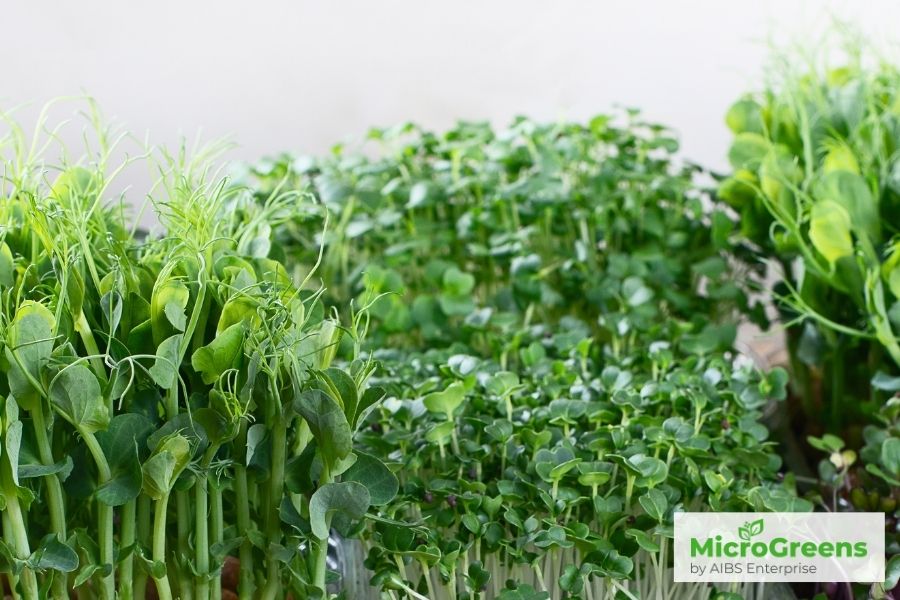
What are the nutritional values of microgreens?
Microgreens are harvested before they have a chance to grow into a full-sized vegetables, so they are much smaller than their mature counterparts. But even though they are small, microgreens are packed with nutritional value. Recent studies found that microgreens have higher levels of nutrients than full-sized vegetables.
Microgreens are a nutrient powerhouse and a great addition to any diet. They are low in calories and a good source of fiber, vitamins, and minerals. Microgreens also contain phytonutrients, which are plant-based chemicals that may offer health benefits. Some of the phytonutrients found in microgreens include anthocyanins, carotenoids, and lutein.
Microgreens Nutrition Contents
| Radish | Dun Peas / Pea Shoots | Mustard | Broccoli | Red Beets | Mizuna | |
|---|---|---|---|---|---|---|
| Vitamins | A, B3, B6, C, E and K | C, A, Antioxidants | Beta Carotene, B1, B3, B6, K | A, B, C, E, K | A, B6, C, E, K | A, C, K |
| Other Nutrients | Calcium, Iron, Folate, Beta Carotene, Magnesium, Manganese, Phosphorus, Potassium and Zinc, Fiber | Iron, Protein, Calcium, Copper, Magnesium, Manganese, Phosphorus, Potassium, Zinc, Fiber | calcium, iron, zinc, selenium, phosphorus and Folate, Fiber, Protein | Calcium, copper, iron, manganese, magnesium, phosphorus, Folate, Potassium, zinc, high level of compounds that convert to sulforaphane, Potassium, sodium, antioxidants | Calcium, iron, Folate, copper, magnesium, manganese, potassium, zinc, antioxidants | Calcium, antioxidants, lutein, zeaxanthin |
| If you have | Best to consume |
|---|---|
| Alzheimer’s Disease | Radish |
| Anemia | Red Beets |
| Anemia | Dun Peas |
| Blood Pressure | Red Beets, Radish, Broccoli, Dun Peas |
| Cardiovascular System | Red Beets, Radish, Dun Peas, Broccoli |
| Detoxify Liver | Mustard, Broccoli |
| Diabetes | Radish, Mustard, Broccoli |
| Digestion and Gut Health | Red Beets, Broccoli |
| Eye Health | Broccoli, Red Beets, Mizuna |
| Fights Cancer | Red Beets, Radish, Dun Peas, Broccoli, Mizuna |
| Hair, Skin and Nails | Radish, Red Beets, Mustard, Broccoli |
| Immunity | Red Beets, Broccoli, Dun Peas, Mustard |
| Osteoporosis | Dun Peas, Broccoli, Red Beets |
| Reduced Inflammation | Broccoli |
| Sinus Congestion | Mustard |
| Thyroid Health | Broccoli |
| Weight Loss | Radish, Broccoli, Dun Peas, Mustard, Red Beets, Mizuna |
NOTE: Above tables are only guides based on researched nutrient contents of each microgreen. It is best for you to consult your doctor first before changing your diet and consuming any recommended products indicated.
What is the most nutritious Microgreen?
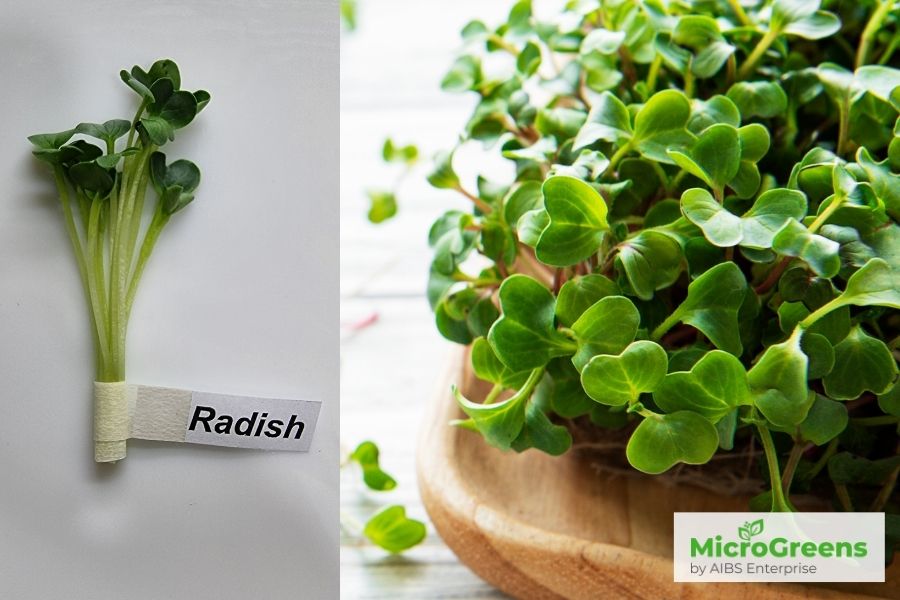
Radish Microgreens
Microgreens are a great source of nutrients for your body. While all microgreens are nutritious, some are more so than others. Radish microgreens are considered the most nutritious microgreen because it is high in antioxidants and vitamin C. It also contains fiber, potassium, and magnesium. Radish microgreens are a good choice if you want to boost your immune system or protect your body from disease.
Radish microgreens are a great choice for your next salad because they contain vitamins A, B3, B6, C, E, and K – nutrients that are essential for optimal health.
Radish microgreens are also a good source of antioxidants, which can help protect your body from disease. In fact, one study found that radish microgreens contained more antioxidants than any other type of microgreen.
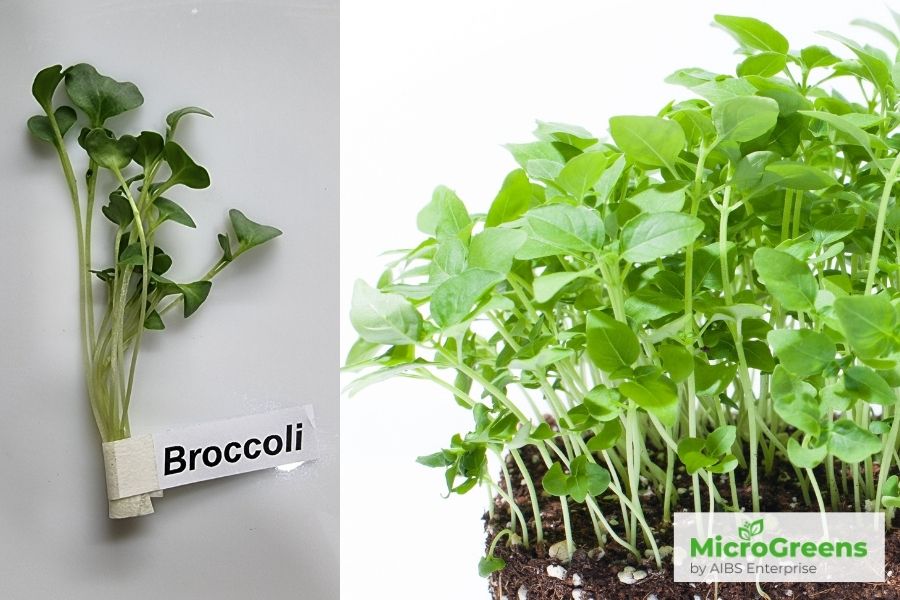
Broccoli Microgreens
As we all know, broccoli is a very healthy vegetable. Did you know that its microgreen is even more nutritious? Broccoli microgreens are packed with antioxidants, vitamins, and minerals. They are a great source of fiber, protein, and omega-3 fatty acids. In addition, broccoli microgreens are low in calories and carbohydrates.
Broccoli microgreens are a great source of sulforaphane, an anti-cancer compound. Sulforaphane is found in many cruciferous vegetables, but broccoli microgreens have the highest concentration. This compound has been shown to inhibit the growth of cancer cells and also reduce the risk of cancer development. In addition to sulforaphane, broccoli microgreens are also a good source of vitamins A and C, as well as minerals like potassium and magnesium.
Broccoli microgreen is a cruciferous vegetable that is known for its many health benefits. One lesser-known benefit of broccoli is its ability to support cardiovascular health. Broccoli microgreens are high in fiber, potassium, and vitamin C, all of which are important for maintaining cardiovascular health. They are also a good source of antioxidants, which can help protect against oxidative damage caused by free radicals.
Broccoli microgreens have anti-diabetic properties. They can help to lower blood sugar levels, control blood pressure, and improve heart health.
Emerging research suggests that broccoli microgreens may help reduce the symptoms of autism. Broccoli microgreens are a powerful source of sulforaphane, a phytonutrient that has been shown to improve cognitive function and reduce inflammation. Including broccoli microgreens in your diet may help improve cognitive function and reduce the symptoms of autism.
Broccoli microgreens are a powerhouse of nutrients that offer anti-aging properties by activating heat shock proteins in the body. These microgreens protect cellular damage from UV radiation and other environmental toxins. Broccoli is high in vitamin C, which is essential for the production of collagen. Collagen is responsible for maintaining the skin’s elasticity and preventing wrinkles from forming. Broccoli microgreens are also a good source of lutein and zeaxanthin, two antioxidants that protect the eyes from age-related damage.
A new study published in the journal Pharmacognosy Research has found that broccoli microgreens may boost brain function and reduce mental decline. The study, conducted by researchers looked at the effects of sulforaphane on brain health. The study found that sulforaphane improved cognitive function and reduced inflammation in the brain. The researchers also found that sulforaphane improved recovery after a stroke. The findings suggest that broccoli microgreens may be beneficial for people with dementia or stroke-related damage to the brain.
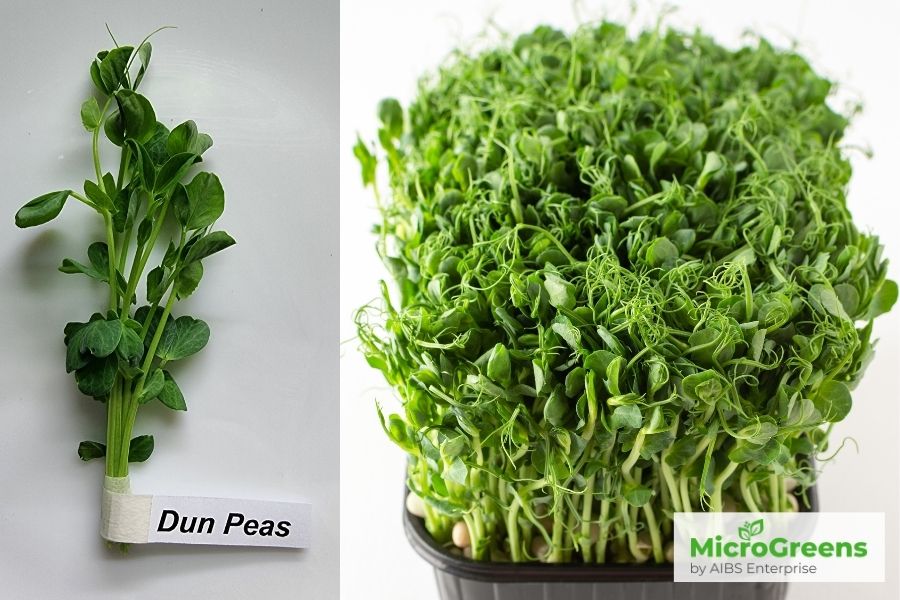
Dun Peas Microgreens
There’s a good reason why dun peas microgreen is nutritious. This small, but mighty superfood packs a powerful nutritional punch. Dun peas microgreen is a rich source of fiber, protein, vitamins, and minerals. It’s also low in calories and carbs, making it a healthy choice for those looking to maintain a healthy weight or eat a gluten-free diet.
Top 5 Reasons why Dun Peas Microgreens are good for your health and diet
1. Dun peas microgreens are a nutritious addition to any diet.
2. They are high in fiber, protein, vitamins, and minerals.
3. Dun peas microgreens are also a good source of antioxidants.
4. They have anti-inflammatory properties and can help improve heart health.
5. Dun peas microgreens are a healthy and delicious way to get the nutrients your body needs.
Dun Peas microgreens are a powerful cancer-fighting food. They are especially rich in phytoestrogens, which help to prevent the development of cancer cells. Additionally, dun peas are high in antioxidants and other nutrients that support optimal health. Due to their small size, they are a nutrient-dense food that can be easily added to any meal for an extra boost of nutrition. Dun peas are also a good source of folate, antioxidants, and carotene.
Folate is a water-soluble vitamin that is mainly found in leafy green vegetables and fruits. It helps the body form new cells and DNA, and also helps prevent changes to DNA that can lead to cancer.
Antioxidants are beneficial against cancer and other diseases, so Dun Peas microgreens are a great way to get your daily dose. A study found that the antioxidant levels in Dun Peas microgreens were higher than those found in mature peas. The researchers believe that the high levels of antioxidants are responsible for the anti-cancer properties of Dun Peas microgreens. (for more information on antioxidants and other guides in nutrition, please check out WebMD)
In addition to being a great source of protein and fiber, Dun Peas are also high in carotene, which is beneficial for eye health. Carotene helps to protect the eyes from age-related damage, and can even help improve vision in people with poor eyesight.
Dun Peas microgreens are a great source of calcium for your body. Calcium is important for strong bones and teeth, healthy muscles and nerve function, and blood clotting.
Simply incorporating a cup of Dun Peas microgreens into your daily diet—whether on salads, sandwiches, soups, and meats — will give your meals a stunning green splash and a sweet, crisp flavor.
Making this easy dietary alteration will give you a wealth of nutrients for only a few calories.
Furthermore, by including Dun Peas shoots in your daily diet, you’ll reap the benefits of cancer-fighting and anti-inflammatory antioxidants, as well as high levels of vitamin C, iron, folate, and other essential vitamins and minerals.
You’ll be giving yourself the gift of noticeable, good, and long-term health advantages, as well as a sweet, delicious flavor to your meals.
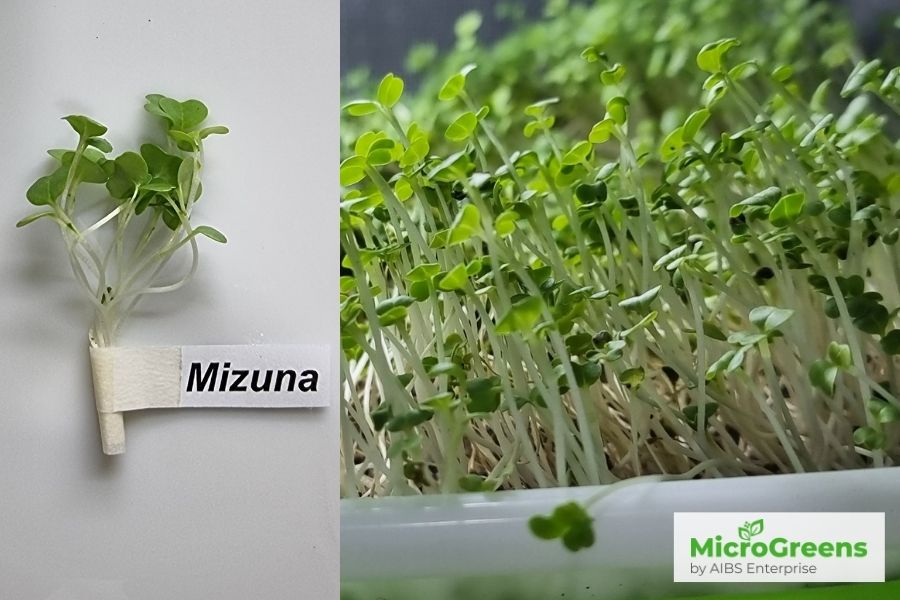
Mizuna Microgreens
When it comes to eating healthy, microgreens are a great way to get the most nutritional bang for your buck. A single tablespoon of mizuna microgreens, for example, provides more than 100% of the recommended daily intake of vitamin A, as well as high levels of vitamins K, C, and E. They’re also a good source of dietary fiber, potassium, folate, and iron. Adding Mizuna microgreens to your dishes is a great way to give exciting flavors to meals. A tablespoon of mizuna microgreens, for example, has been found to be equal in flavor to one serving of spinach.
This nutritional powerhouse is low in calories and packed with a slew of health benefits. Mizuna microgreens, a member of the Brassica family of plants that is prevalent in Japanese cuisine but has begun to make their way into global kitchens.
Mizuna microgreens are similar to arugula or young mustard greens, they can be eaten raw or cooked and is versatile in a variety of cuisines. Not only is it easy to grow and maintain, but this unusual green can resist even the harshest circumstances and temperatures, making it suitable for both rookie and expert gardeners.
The majority of Mizuna microgreens’ health advantages stem from its high nutrient content, which includes antioxidants. Antioxidants are substances that work by neutralizing potentially harmful free radicals, thereby preventing cell damage and decreasing the risk of chronic disease.
Mizuna microgreens also include Kaempferol, a phytochemical that functions as an antioxidant and have been linked to several health advantages. Kaempferol has been found to prevent cancer cell proliferation, protect healthy cells, and reduce chronic inflammation.
Mizuna microgreens are high in vitamin K, a critical nutrient that performs a variety of tasks in the body. Vitamin K, in particular, aids in the proper development of blood clots.
Coagulation is important because it assists in preventing excessive bleeding by producing a clot and initiating the healing process. Vitamin K shortage can interfere with this process, resulting in increased blood loss and bruising.
Apart from promoting good blood clotting, vitamin K is also important for bone health. Vitamin K is believed to have a direct effect on bone metabolism and a beneficial effect on the calcium balance, a mineral that is necessary for the development of strong bones and the preservation of bone density.
Numerous studies have discovered that increasing vitamin K consumption may lessen the incidence of bone fractures in some populations. Mizuna microgreens are a good source of vitamin K, delivering 348% of the required daily dose in just one cup.
Mizuna microgreens’ impressive nutritional profile and high antioxidant content may also help maintain an efficient immune system. This is partly due to its high vitamin C content, with one cup providing around 65% of the daily required dose.
If you’ve ever stocked up on citrus fruits or taken vitamin C supplements when you felt the colds coming on, you did so for a reason. Vitamin C has been demonstrated to lower the duration and severity of respiratory tract infections and may also help prevent and treat malaria and pneumonia.
Additionally, Mizuna microgreens are abundant in antioxidants, which might aid further boost immunity. Antioxidants have been demonstrated to boost immune function while also providing protection from infection.
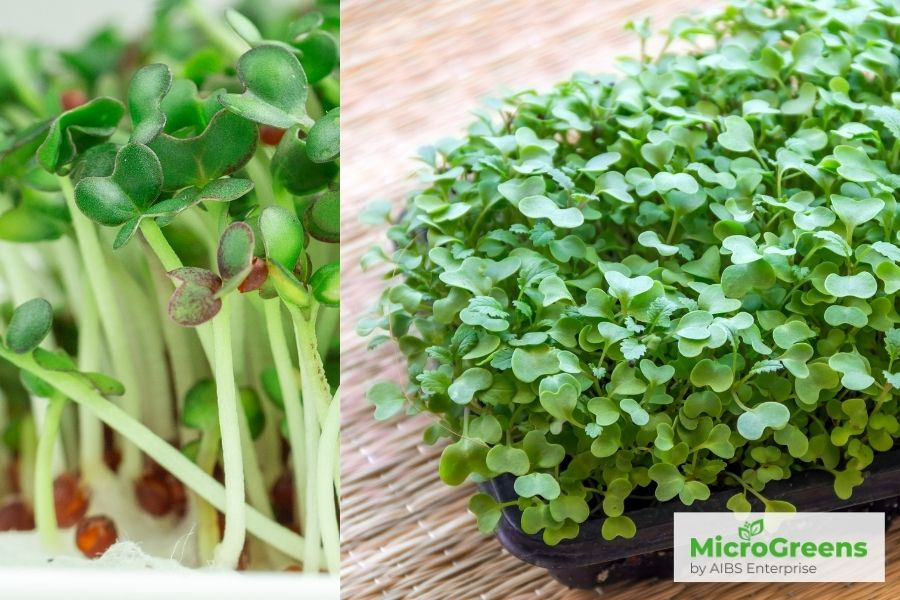
Mustard Microgreens
There are many reasons why mustard microgreens are considered a nutritious food. For one, they are an excellent source of vitamins A, C, and K. They also provide important minerals like potassium and magnesium. Additionally, mustard microgreens are a good source of fiber and protein. This combination of nutrients makes them an ideal food for maintaining good health.
Mustard microgreens are a great source of dense protein, fiber, folate, calcium, and iron. They also contain glucosinolates which have been shown to fight diabetes. It is high in beta-carotene, which is great for promoting healthy hair and skin. They are also rich in vitamins C and K, both of which are essential for maintaining a strong immune system. Additionally, mustard microgreens contain detoxifying minerals like iron and zinc.
These tiny greens can also help relieve congestion and improve digestion.
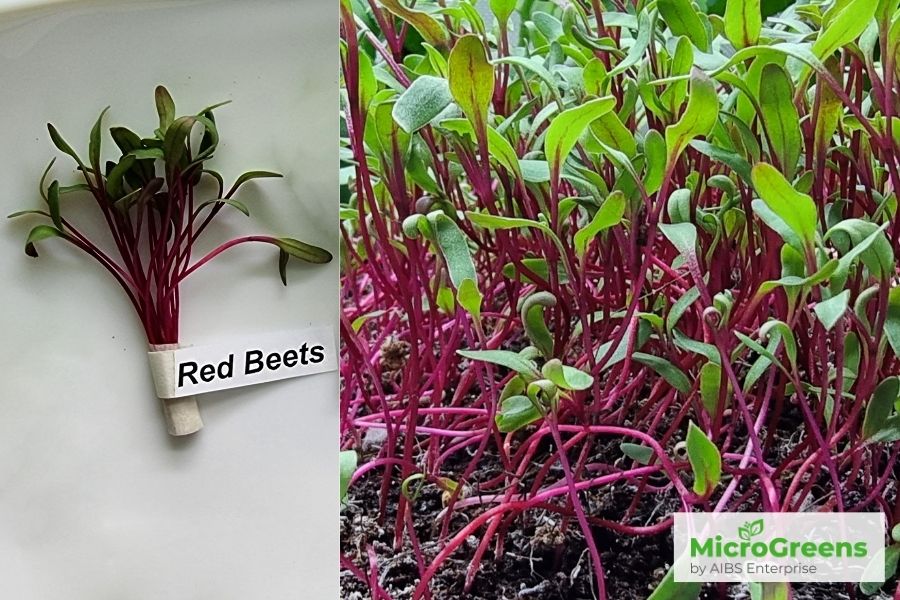
Red Beets Microgreens
When it comes to eating healthy, most people think about consuming a variety of fruits and vegetables. While this is important, many overlook the nutritional benefits of microgreens. Red Beets microgreens are considered one of the most nutritious varieties. Red beets microgreens are an excellent source of antioxidants. Antioxidants are compounds that protect your body from damage caused by free radicals. Free radicals are harmful molecules that can cause cell damage and degeneration in the body’s cells and tissues.
Red Beets microgreens are a root vegetable that is typically red in color. Red Beets microgreens are a good source of vitamins A and C, as well as fiber. They are also a good source of phytonutrients, which are plant-based chemicals that may have health benefits. Some phytonutrients found in Red Beets microgreens include betalains and anthocyanins. Betalains have been shown to have anti-inflammatory and antioxidant properties, while anthocyanins may help protect against cancer and heart disease.
Red beets microgreens are an excellent source of vitamin C, which is important for boosting immunity. They are also high in antioxidants, including beta-carotene and lutein, which help protect against cell damage caused by free radicals. Red beets microgreens are a good source of dietary fiber, potassium, and manganese.
Red Beets microgreens are rich in iron, making them a good choice for people who are iron-deficient to fight anemia. They also contain nitrates, which are converted to nitric oxide in the body. Nitric oxide helps to improve blood pressure by relaxing the blood vessels. These nitrates also help maintain cardio health by dilating arteries and veins and increasing blood circulation.
What is the biggest benefit of eating microgreens?
Microgreens are nutrient-rich food that offers a variety of benefits for your health. They are a great source of fiber, vitamins, and minerals, and they provide important antioxidants that can help protect your body against disease. Microgreens also contain beneficial plant compounds that can improve your health and reduce your risk of cancer.
The biggest benefit of microgreens is that they are already considered a complete nutrition food. They provide more nourishment than regular vegetables. Microgreens are packed with antioxidants, vitamins, minerals, and enzymes that fight disease and improve overall health.
Cleaning Your Colon with Microgreens
The gut is often called the “second brain” and for good reason. The intestinal flora, which is the term for healthy gut bacteria, can have a profound impact on everything from mood to weight to overall health. A recent study showed that there may be a link between gut flora and autism spectrum disorders.
Microgreens, similar to other vegetables and fruits, are packed with beneficial nutrients that offer both health and therapeutic benefits. Rich in fiber and antioxidants, microgreens help cleanse and protect the body against harmful toxins and free radicals. Additionally, they contain essential vitamins, minerals, and phytonutrients that improve gut flora and healthy bacteria. Consuming microgreens on a regular basis can help boost overall health and well-being.
Can we eat microgreens daily?
Yes, you can eat microgreens daily! Not only nutritious, but they also have a delicious flavor. Microgreens are a great way to add crunch, color, and variety to your diet. They can be eaten raw or cooked, and are a great addition to salads, sandwiches, meats, and soups.
Conclusion
In conclusion, eating microgreens daily may help prevent certain diseases, including cancer. Microgreens are a rich source of antioxidants, vitamins, minerals, and other nutrients that are essential for good health. They are low in calories and high in fiber, making them a healthy choice for people who want to lose weight or maintain a healthy diet. They are also a good source of protein to improve muscle build-up. If you are not currently eating microgreens daily, start today and see the benefits for yourself.
Have you included microgreens in your diet today?

